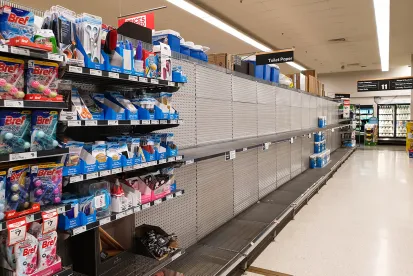The rapid spread of COVID-19 in the United Kingdom and the measures being implemented to counter the disease have resulted in an unprecedented surge of consumer demand for groceries and other essential supplies. Safeguarding consumers against shortages and high prices is at the heart of two recent measures adopted by the UK government and the UK Competition and Markets Authority (CMA).
As in many other parts of the world, the surge in demand in the UK started with hand sanitiser and toilet tissue but quickly spread to a variety of basic supplies. While the main supermarket chains active in the UK maintain that they have adequate stocks, the significant increased demand has resulted in high pressure on supply chains, a shortage of delivery slots for groceries and other items ordered online, and bare shelves in many shops. In the meantime, the shortage of supply, particularly of hand sanitiser, has resulted in an escalation of prices.
1. Managing Supply
Many supermarkets have individually already taken a variety of measures to ensure every consumer has access to the basics. These range from per-customer limits, restricting the number of individual products that can be purchased at a time, adjusting opening hours to allow time for restocking, introducing dedicated shopping times for vulnerable customers and health workers, and cutting the range of products on offer to increase efficiency.
These individual initiatives can go only so far in protecting consumers. The four largest UK supermarkets have been in discussions with the government since early March to argue for suspension of the UK rules that prohibit competitors from coordinating their activities, to allow them to work together to ensure that all customers, including vulnerable customers, remain able to purchase adequate supplies of groceries. On 19 March 2020, the UK government announced that the rules will be temporarily relaxed to enable supermarkets to pool staff and share stock level data, distribution depots, and delivery vans.
This is the first relaxation of the UK rules. Detailed proposals have not yet been published, but it is expected that legislation amending the UK Competition Act 1998 will be laid before Parliament in the near future.
In addition, where agreements are not covered by anticipated relaxation, the CMA has taken the unusual step of providing reassurance that it has “…no intention of taking competition law enforcement action against cooperation between businesses or rationing of products to the extent that this is necessary to protect consumers – for example, by ensuring security of supplies.” At the same time, the CMA warned against companies using the relaxation of the competition rules as cover for “non-essential collusion”, for instance in relation to longer term pricing or commercial strategies.
2. Protecting Consumers Against Exploitative Practices
The escalation in pricing of hand sanitisers has already prompted the CMA to contact traders and online platforms with a warning about excessive pricing. However, more wide-ranging measures were clearly considered necessary and on 20 March 2020, the CMA announced the launch of its COVID-19 task force, to address concerns that “…businesses might exploit the situation to take advantage of people, for example by charging excessive prices or making misleading claims about their products…”.
The aim of the task force is to scrutinise market developments to identify harmful sales and pricing practices, contact the relevant businesses and if there is evidence that they have breached either competition or consumer protection law, issue them with a warning. If the warning goes unheeded, the task force will take enforcement action. It also has an advisory role and will provide advice to the government on emergency legislation to address any negative impacts on consumers that cannot be addressed through existing legislation. It will also advise the government on how to ensure that competition law does not obstruct legitimate measures that protect public health and support the supply of essential goods and services and on other policy and legislative measures to ensure markets can function as well as possible during the crisis.
Conclusion
The speed in which these measures have been announced underscores both the perceived seriousness of the situation and the determination of the UK government and the CMA to ensure that competition law does not stand in the way of protecting consumers from the immediate effects of the current crisis, while at the same time seeking to prevent unscrupulous businesses from profiteering at the expense of consumers. These actions are aligned with the raison d'être of competition law in the UK: the protection of consumer welfare.




 />i
/>i

